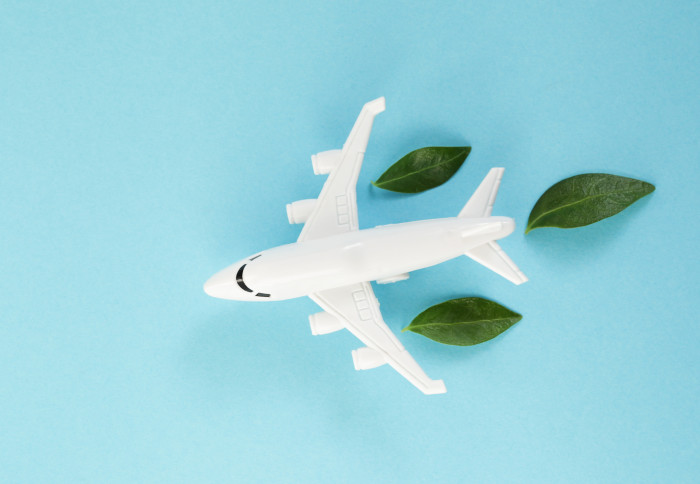World’s first net zero transatlantic flight to fly from London in 2023

Imperial researchers will work with Virgin Atlantic to launch the world’s first transatlantic flight powered solely by sustainable aviation fuel.
The passenger flight from London to New York will be fuelled by 100 per cent sustainable aviation fuel (SAF), combined with carbon removal through biochar credits – a material that traps and stores carbon taken from the atmosphere – making the flight net zero. The initiative is funded by the UK government’s Department for Transport.
SAFs have the potential to significantly reduce lifecycle emissions compared to conventional jet fuel, and combined with greenhouse gas removal from the atmosphere, we can achieve net-zero emissions on this flight. Dr Marc Stettler Department of Civil and Environmental Engineering
This flight could herald a low-carbon future for aviation, an emissions-heavy industry. SAFs, which are made from sustainable raw materials like waste oils and fat, could slash lifecycle carbon emissions by over 70 per cent compared to conventional kerosene-based jet fuel.
Imperial College London researchers will work with Virgin Atlantic, Rolls-Royce, Boeing, and the University of Sheffield to advise the flight team on energy-efficient routes and analyse the wealth of data on carbon and non-carbon emissions gathered from the Boeing 787 flight.
Dr Marc Stettler of the Department of Civil and Environmental Engineering, who is leading the Imperial team of researchers for the project, said: “We’re delighted to be part of this project to advance our understanding of the non-CO2 effects of flying. As we adopt sustainable aviation fuels to decarbonise aviation, it’s essential that we also evaluate and reduce the non-CO2 climate impacts.
“SAFs have the potential to significantly reduce lifecycle emissions compared to conventional jet fuel, and combined with greenhouse gas removal from the atmosphere, we can achieve net-zero emissions on this flight.”
Transport Secretary Mark Harper said: “Not only will this flight pave the way for future generations, but it will demonstrate just how much we can achieve when we work together on a shared goal – bringing together some of the best businesses and academics in the world and led by a British airline.”
Accounting for contrails
Aviation accounts for 2.5 per cent of global carbon emissions, but the industry’s overall contribution to climate change is higher because of its impacts on non-carbon pollutants in the atmosphere which encourage warming.
To study the overall impact of alternative fuels, we will quantify these emissions across the fuel’s lifecycle, from production to combustion. Dr Roger Teoh Department of Civil and Environmental Engineering
When hot exhaust gases from aircraft meet the cold, low-pressure air of the atmosphere, they produce white streaks of water ice clouds in the sky called 'condensation trails', or contrails. When summed up over all flights, these contrails are thought to be responsible for two thirds of the climate effects of aviation.
In 2022 Imperial researchers used computer simulations to demonstrate that SAF reduces emissions of soot and particulate matter from aircraft engines, lessening the warming impacts of contrails. Contrails formed when using SAF comprise of fewer, larger ice particles, thereby shortening the lifetime of contrails persisting in the atmosphere, reducing their climate effect. SAF could also improve local air quality around airports.
In 2020, they also demonstrated that making small changes to a flight’s altitude could reduce contrail impacts by 59 per cent.
SAF is currently in short supply, so the researchers say it is important that supplies are used on flights that would benefit most. The Imperial team will gather flight emissions data of current flights to quantify both CO2 and non-CO2 impacts. The research will enable them to provide a contrail forecast for the net-zero flight to inform route planning to minimise its non-CO2 impacts. It will also demonstrate operational efficiency improvements and flight optimisations needed to achieve more net-zero flights.
Dr Roger Teoh, also from Imperial’s Department of Civil and Environmental Engineering, said: "While the supply of SAF remains scarce, our research showed that the overall climate benefits from SAF can be further maximised if the supply is targeted to flights that are forecast to form persistent warming contrails. By doing so, SAF would reduce the climate impacts of contrail cirrus, in addition to its CO2 lifecycle benefits.
“To study the overall impact of alternative fuels, we will quantify these emissions across the fuel’s lifecycle, from production to combustion.”
Image: Shutterstock
Article text (excluding photos or graphics) © Imperial College London.
Photos and graphics subject to third party copyright used with permission or © Imperial College London.
Reporter
Caroline Brogan
Communications Division